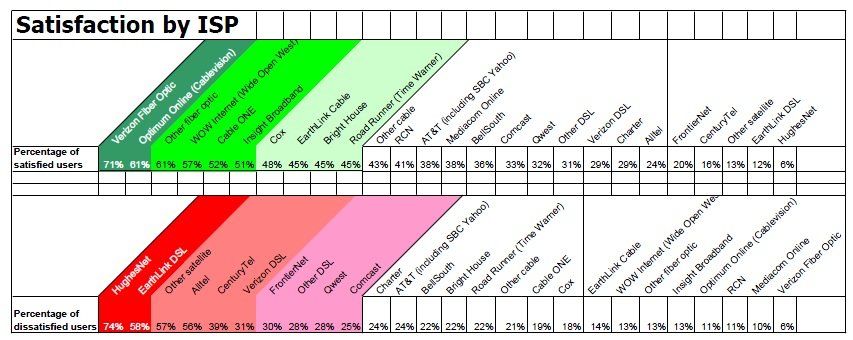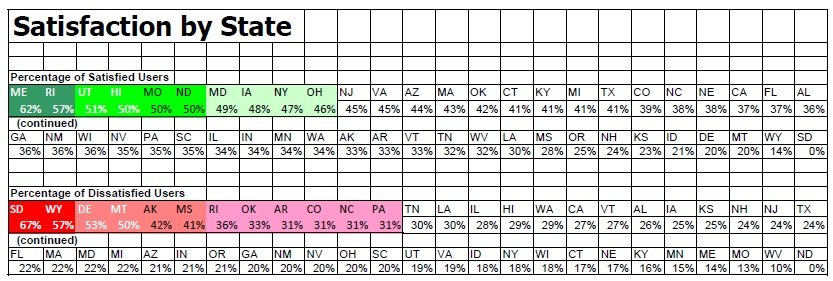Frontier’s webmasters have been working overtime today apparently doing some damage control, as well as issuing some clarifications about their new usage caps. But like much of the mixed and muddied message customer service representatives are sending customers, the website now contains several inconsistencies and contradictions between the product description page and the Acceptable Use Policy.
Because of the changing story, we’ve decided to begin capturing and saving select pages from Frontier’s website and will be adding them to a new Reference Library under construction. From there, you can download and save Adobe PDF versions of captured web pages, dated for your convenience. Unfortunately, with the shifting positions of Frontier, what may be on the website today may be gone tomorrow. If engaged in an effort to cancel service, it may be useful to have some of these pages available to reference, because customer service representatives may not be able to locate them.
Let’s breakdown what has changed in the last 24 hours.
First, it’s obvious readers are making a difference. Frontier realizes they have a public relations problem on their hands of their own making. The complaint calls and cancellation requests have clearly made an appropriate impact on the company, although not to the point of shelving the idea of a usage cap. The company has instead decided to try and manage the story more carefully in hopes of controlling the message. Unfortunately for them, as long as they want to impose caps on customers, we will be here to debunk the fictional excuses, expose the inconsistencies, and educate consumers about why they should not be convinced that less equals more.
Second, the original Acceptable Use Policy dated July 23, 2008 for residential customers remains in place:
Customers must comply with all Frontier network, bandwidth, data storage and usage limitations. Frontier may suspend, terminate or apply additional charges to the Service if such usage exceeds a reasonable amount of usage. A reasonable amount of usage is defined as 5GB combined upload and download consumption during the course of a 30-day billing period.
This is now in direct contradiction with a new section attached to the product information page for the residential DSL product, which includes this new language:
If I hit 5GB will my service be interrupted?
No. Your service will not be interrupted at 5Gb. You will continue to use our High Speed Internet service without disruption.
Does Frontier plan to limit my use of the Internet?
No, there are no plans to limit customer usage. On average a Frontier High-Speed Internet customer uses less than 1.5GB per month. Frontier residential High-Speed Internet service comes with 5G per month (about 5,000 Megabytes), which is more than double the monthly consumption of most of our subscribers.
We appreciate the company’s apparent new policy not to suspend or terminate accounts for exceeding their 5GB usage cap, but their Acceptable Use Policy requires immediate revision to ensure consistency.
Third, the newest promotional page includes this laugh-out-loud passage. If you are seriously considering imposing a draconian usage cap of 5GB, which is obviously so unacceptable to a significant number of your customers that are calling to complain and cancel service, maybe this passage is just pushing things a little too far:
We all love the Internet, and Frontier is committed to offering you all the bandwidth you need and want to take full advantage of the Web! Our basic residential Internet packages offers 5GB usage — that’s the equivalent of 500,000 basic text e-mails, 2,500 Photos, 40,000 Web Pages, over 300 Hours of Online Game Time, 1,250 downloaded songs, or a mixture of the above!
This kind of writing convinces me the folks in Frontier’s Marketing Department have finally joined the party. Welcome aboard, but remember, if customers were upset enough to protest a 5GB usage cap, rubbing it in their face by telling them you love the Internet and are committed to offering all the bandwidth “you need” (if the year is 1988 and you have a 1200bps dial-up modem) will be seen as fighting words. Telling customers 5GB a month lets you take full advantage of the Web is fine, if you never do anything except browse low density web pages. Maybe we can Gopher and Telnet some things as well. Somehow I doubt the marketing people will understand the irony of either.
The rest doesn’t get much better. If Frontier wants to learn more about The Internets, they can use The Google to read about average customer reactions to broadband user caps and exactly what defines a “power user.” Someone who exceeds 5GB a month hardly qualifies. Also, another inconsistency: If Frontier has not implemented a usage cap plan, then why does the language implementing it remain in the Residential Acceptable Use Policy?
What are “bandwidth caps” and what does it mean for Internet users?
“Caps” are thresholds where Internet Service Providers could deem usage in excess of “normal” usage. For the majority of our users, bandwidth caps will not be reached. However, some users have multiple servers or computers or download huge files that demand large amounts of available bandwidth. In response to these “power users,” the industry is moving toward “tiered usage” plans that would be applicable when consumption reaches certain bandwidth levels. This type of plan would result in heavy users paying for their fair share of usage and will make sure that average users do not subsidize high-usage consumers. Other Internet Service Providers like Comcast and Time Warner are testing these tiered usage plans. Frontier has not implemented tiered usage plans and will continue to evaluate if and when they would be necessary. If and when Frontier implements a tiered usage plan pricing and usage information will be communicated to all High-Speed customers.
Before we go, let me add there is a bit of good news from Frontier today, which is to their credit, assuming they publish this policy in the form of a written guarantee to customers, which amend their term contracts to assure them this language will remain in place regardless of if it appears on the website or not. Until a written assurance is in hand, a promotional blurb on a product description page is insufficient to make me withdraw my recommendation to cancel service within the 30 day opt-out window:
If Frontier rolls out tiered usage plans, will my Pricing / Plan change if I am on a Frontier Price Protection Plan?
Pricing for customers on Frontier’s Price Protection Plan will not change during your initial term commitment if we roll out tiered usage plans.
This language should be slightly modified to state that any overage fees for bandwidth in excess of 5GB do not apply to Frontier Price Protection Plan customers, and that no penalty or disruption in service will occur if a customer exceeds the 5GB usage cap planned for more formal implementation in the near future. Assuming that language is in place, it means that customers on a 12-36 term commitment will not have to worry about any usage caps and they will not apply to them for the remainder of their contract. But, again, an inconsistency remains here as well. The Acceptable Use Policy clearly states the 5GB limit is in place right now. Further reference to this should also be included on the Terms & Conditions page, which also contains the opt-out clause, to clarify that usage caps do not apply to customers with a contract that does not specifically include them.
Stop the Cap! continues to call on Frontier to discard the usage cap limitation altogether. Next week, we’ll have some better ideas for Frontier to consider that will not alienate their customer base and positions them to begin competing more effectively in their service areas.
This article was updated at 11:58pm, August 6, 2008 and replaces language from an article entitled “Breaking News” posted earlier this evening.


 Subscribe
Subscribe




